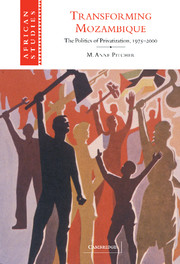Book contents
- Frontmatter
- Contents
- List of figures
- Preface
- List of abbreviations and acronyms
- Glossary
- Map
- Introduction
- 1 The reconfiguration of the interventionist state after independence
- 2 Demiurge ascending: high modernism and the making of Mozambique
- 3 State sector erosion and the turn to the market
- 4 A privatizing state or a statist privatization?
- 5 Continuities and discontinuities in manufacturing
- 6 Capital and countryside after structural adjustment
- 7 The end of Marx and the beginning of the market? Rhetorical efforts to legitimate transformative preservation
- Bibliography
- Index
- OTHER BOOKS IN THE SERIES
7 - The end of Marx and the beginning of the market? Rhetorical efforts to legitimate transformative preservation
Published online by Cambridge University Press: 22 September 2009
- Frontmatter
- Contents
- List of figures
- Preface
- List of abbreviations and acronyms
- Glossary
- Map
- Introduction
- 1 The reconfiguration of the interventionist state after independence
- 2 Demiurge ascending: high modernism and the making of Mozambique
- 3 State sector erosion and the turn to the market
- 4 A privatizing state or a statist privatization?
- 5 Continuities and discontinuities in manufacturing
- 6 Capital and countryside after structural adjustment
- 7 The end of Marx and the beginning of the market? Rhetorical efforts to legitimate transformative preservation
- Bibliography
- Index
- OTHER BOOKS IN THE SERIES
Summary
Over the past quarter century, Mozambique has twice experienced decisive institutional and ideological ruptures. Independence brought profound changes, such as the juridical abolition of many oppressive colonial laws and the replacement of the Portuguese colonial government by an independent, socialist, and nationalist Mozambican one. In the workplace and on the streets, institutionalized forms of racial and ethnic segregation declined. State economic intervention nearly eliminated settler farms in agriculture and vastly reduced the role of the private sector in industry and agriculture. Discursively, the new government intertwined the languages of socialism, nationalism, and modernism to express its multiple and momentous goals. The iconography of the early post-independence period generated by the National Directorate of Propaganda and Publicity represented the revolution's objectives by glorifying those who had been oppressed before and depicting them in new, liberated roles as a result of the Frelimo victory. Inspired by the political art of the Russian Revolution, revolutionary posters in Mozambique reproduced the Soviet image of the heroic male blacksmith with his hammer to symbolize the struggle of workers. Many early posters incorporated the five-pointed red star to symbolize Mozambique's solidarity with other socialist countries. Replacing the Soviet sickle with the Mozambican hoe, the iconography also addressed the critical role that smallholders were to play in the new Mozambique.
The transition from socialism to capitalism, from the one-party state to a notionally democratic one, also represents a sharp departure from the institutions and policies introduced since independence.
- Type
- Chapter
- Information
- Transforming MozambiqueThe Politics of Privatization, 1975–2000, pp. 236 - 264Publisher: Cambridge University PressPrint publication year: 2002

